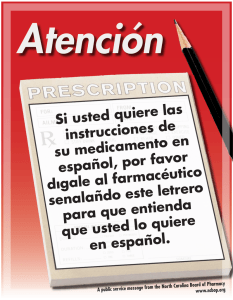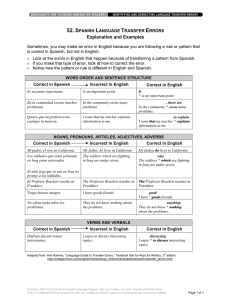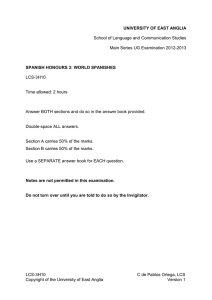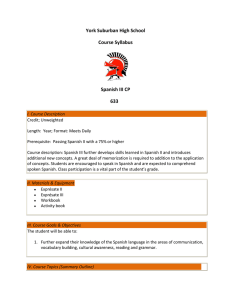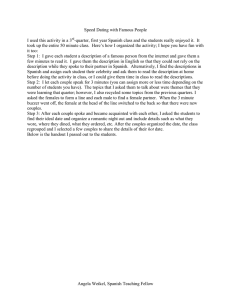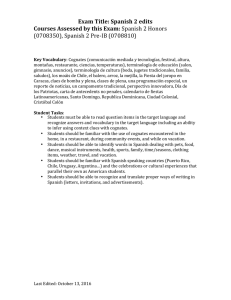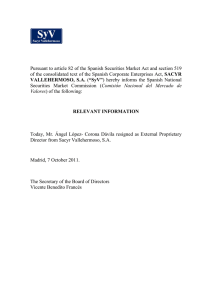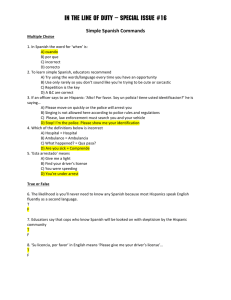All Around This World: Latin America for CLASSROOMS
Anuncio
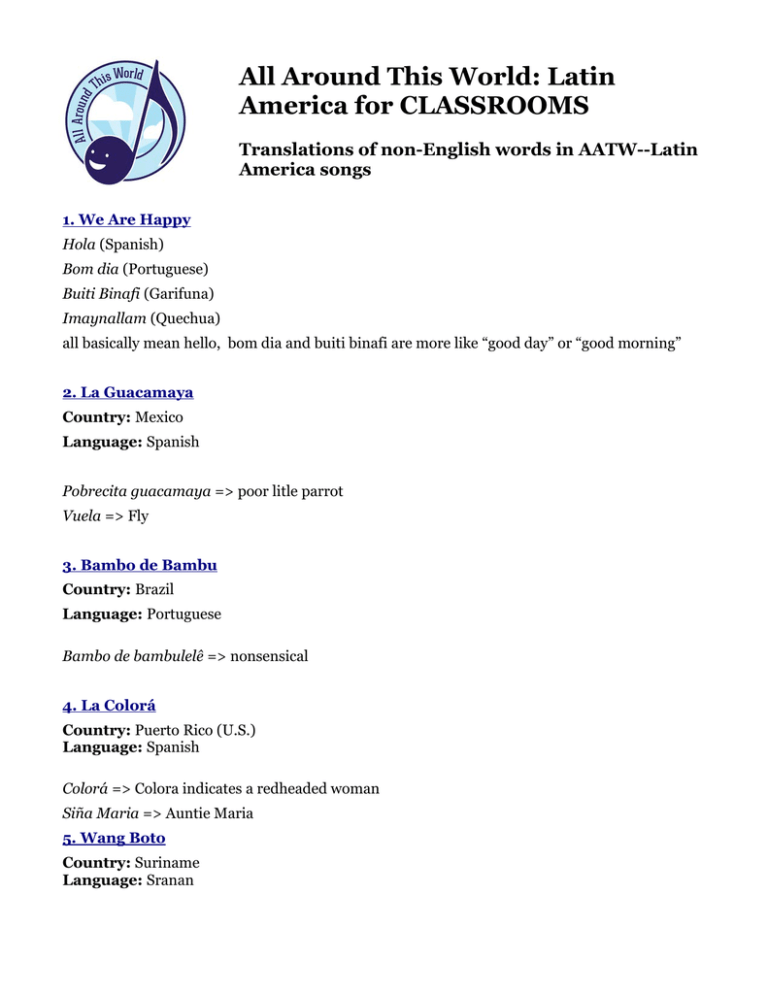
All Around This World: Latin America for CLASSROOMS Translations of non-English words in AATW--Latin America songs 1. We Are Happy Hola (Spanish) Bom dia (Portuguese) Buiti Binafi (Garifuna) Imaynallam (Quechua) all basically mean hello, bom dia and buiti binafi are more like “good day” or “good morning” 2. La Guacamaya Country: Mexico Language: Spanish Pobrecita guacamaya => poor litle parrot Vuela => Fly 3. Bambo de Bambu Country: Brazil Language: Portuguese Bambo de bambulelê => nonsensical 4. La Colorá Country: Puerto Rico (U.S.) Language: Spanish Colorá => Colora indicates a redheaded woman Siña Maria => Auntie Maria 5. Wang Boto Country: Suriname Language: Sranan Wang Boto e kong nanga wang fraga Wang Fraga no’ mo’ hanga de? Basically means, One boat is coming with just one flag Why is only one flag hanging? 6. Cachumbambè Country: Cuba Language: Spanish Cachumbambè, La vieja Ines, Que bebe guarapo y no toma café => See saw, old lady Ines she will drink guarapo (a sugar cane drink) but she won't drink coffee. 7. Our Story May Be Sad Country: Honduras Language: Garifuna Yunruhuma ya arihabei habuidunmenia Mafarulubadina lamise means Sit here and you can see the beauty around us, Evilness will not triumph over me. Sung on CD version: Mma lubuidun => it is so good Habinahan => you dance (plural) 8. Este Torito Country: Mexico Language: Spanish Este torito que traigo lo traigo desde Tepango, Lo traigo desde Tapango, este torito que traigo Y lo vengo manteniendo con cascaritas de mango. Este torito que traigo lo traigo desde Tepango, basically means: This little bull I am bringing comes here from Tepango He comes here from Tepango, the little bull I am bringing To get him to come here with me I feed him lots of mango. This little bull I am bringing, he comes here from Tepango 9. A Canoa Country: Brazil Language: Portuguese A canoa virou, quem deixou ela virar Foi por causa da [child's name], que não soube remar Siriri prá cá, siriri prá lá, siriri prá cá, siriri prá lá basically means: The canoe flipped and who made it flip was it you? It was because of [child's name], now what are we going to do? Paddle left and paddle right, paddle left and paddle right, paddle left and paddle right, paddle left and paddle right. 10. Un Barco Chiquitito Country: all over Latin America Language: Spanish Habia una vez un barco chiquitito Que no podia, no podia, no podia parar. Basically means: Once upon a time there was a little boat And it could, and it could, and it could not stop. 11. Niño Colla Country: Argentina Language: Spanish Soy un Colla chiquitito, vivo solo en mi ranchito. Con mis ojotas de cuero, ya me voy camino al cerro. Basically means: I’m a little Colla boy, I live on this tiny farm I put on my leather sandals on my way up to the hill. 12. Citron Country: Mexico Language: Spanish Al Citron de un fandango, Sango sango, Sabare de la randela, con su triki triki tron. The lyrics are essentially nonsense. Citron is a lemon. 13. La Llave Country: All over Latin America Language: Spanish ¿Donde esta la llave? => Where is the key? Mate-rile-rile-rile => vocables Pon! => vocable 14. O Pião Country: Brazil Language: Portuguese O pião => a top Entrou na roda => entered the “round” (the round area) dancou => danced Roda pião, bambeia pião => spinning wheel, wobbling wheel 15. Las Mañanitas Country: All over Latin America Language: Spanish Qué linda esta mañana en que vengo a saludarte, venimos todos con gusto, y placer a felicitarte Despierta, mi bien, despierta, mira que ya amaneció, ya los pajarillos cantan, la luna ya se metió. Basically means: How beautiful is morning, we’re here to sing along We all will sing together and we’ll start with this song Wake up dear, wake up my darling, rub your eyes, it’s almost dawn The little birds are singing and the nighttime has gone. 16. Mayan Peace Song Country: Mexico Language: vocables La la la => la la la 17. La Luna Country: All over Latin America Language: Spanish Quisiera ser tan alto como la luna, Ay-ay-ay! Como la luna Quisiera ser paloma y poder volar, Ay-ay-ay! y poder volar basically means I’d like to be as the moon way up high, high, high, Ay-ay-ay! way up high, high, high. I’d like to be a dove so I could fly fly fly, Ay-ay-ay! I could fly fly fly 18. Tambobambino Country: Peru Language: Quechua Tambobambino maqt'acha ¡Wifalita wifala, wifalata wifala A little boy from Tambombamba (a village in Peru) went walking What a foolish little boy 19. Ahora es Cuando es Country: Cuba Language: Spanish Genre on CD: Conga Ahora es cuando es basically means Now is the time 20. Arroro Mi Niño Country: Argentina Language: Spanish Arroro => (soothing sound, hush) mi niño => my child Mi sol => my sun Pedazo de mi corazon => piece of my heart 21. Los Pollitos Country: Puerto Rico (U.S.) Language: Spanish Los pollitos dicen pío, pío, pío, cuando tienen hambre cuando tienen frío. La gallina busca el maíz y el trigo, les da la comida y les presta abrigo. Bajo de sus alas, acurrucaditos. duermen los pollitos hasta el otro día! Basically means: All the little chicks say pio pio pio when they are hungry and when they are cold. Mother chicken looks for corn and wheat. She will give them shelter and something to eat. Under mama's wing the little chickens keep, until the next morning they are all asleep. 22. Azulão Country: Brazil Language: Portuguese Vai, Azulão, Azulão companheiro, vai! Vai ver minha ingrata, diz que sem ela O sertão náo é mais sertão! Ai! Vão a Azulão vai contar companheiro, vai! Basically means Go, bluebird, friend, go to find my ungrateful (friend), tell her that the Sertao (a part of Brazil deemed to be barren) is no longer the same Go bluebird, friend, go and tell her. 23. Goodbye Adios (Spanish) Tchau (Portuguese) Ayo (Garifuna) Awallyah (not sure of spelling) (Quechua) all basically mean goodbye
